
THE INDIAN CONTRACT ACT (ICA), 1872. What is a contract?. Contract-Section 2(h) “An agreement enforceable by law is a contract”. Agreement-Section 2(e) “Every Promise and every set of promises forming consideration for each other”.

yaholo + Follow
Download PresentationAn Image/Link below is provided (as is) to download presentation Download Policy: Content on the Website is provided to you AS IS for your information and personal use and may not be sold / licensed / shared on other websites without getting consent from its author. Content is provided to you AS IS for your information and personal use only. Download presentation by click this link. While downloading, if for some reason you are not able to download a presentation, the publisher may have deleted the file from their server. During download, if you can't get a presentation, the file might be deleted by the publisher.

2. Section 2 (h) defines a contract as ? an agreement enforceable by law" thus to make a contract there must be An agreement The agreement shall be enforceable by law.All agreements are not enforceable by law and therefore, all agreements are not contracts.. 3. Agreement . According to Sect
851 views • 47 slides
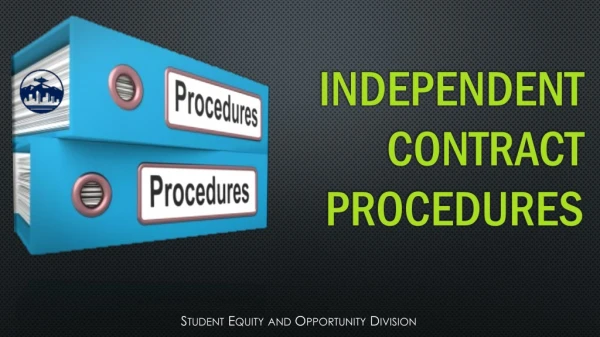
Independent contract procedures. Student Equity and Opportunity Division. They are used to contract services from outside vendors. Independent contractor agreements. What ica stands for:.
415 views • 8 slides
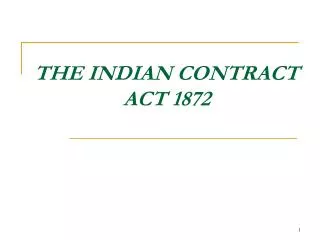
THE INDIAN CONTRACT ACT 1872. Section 2 (h) defines a contract as “ an agreement enforceable by law” thus to make a contract there must be An agreement The agreement shall be enforceable by law. All agreements are not enforceable by law and therefore, all agreements are not
1.67k views • 47 slides

THE SALES OF GOODS ACT (1930). INTRODUCTION. Before The Sales of Goods Act,transactions relating to sales and purchase of goods were regulated by The Indian Contract Act 1872.
303 views • 0 slides

The Indian Act. 1876. What is the Indian Act?. The Indian Act is a legal document and a set of laws that was first passed by the Canadian Government in 1876 and is still enforced today. This set of laws gave the government complete control over the lives of Aboriginal peoples.
977 views • 20 slides

Indian Contract Act 1872. The term “Contract” in ordinary sense means an agreement between two persons. The law of contract seeks to regulate the behavior of persons who make contracts, so that any conflict arises between these persons later may be resolved. Meaning of Contract:
888 views • 14 slides

Indian Contract Act 1872 Contract - Agreement between 2 or more persons which law will Enforce. Essentials: 2 or more parties Offer and Acceptance – one has to offer and other has to Accept Identity of Minds – Agreed upon the Subject Matter
1.21k views • 12 slides
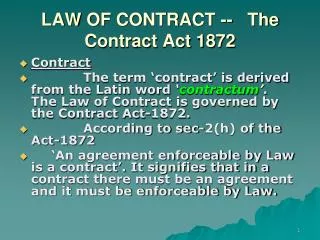
LAW OF CONTRACT -- The Contract Act 1872. Contract The term ‘contract’ is derived from the Latin word ‘ contractum ’ . The Law of Contract is governed by the Contract Act-1872. According to sec-2(h) of the Act-1872
2.09k views • 26 slides
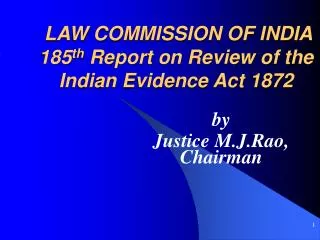
LAW COMMISSION OF INDIA 185 th Report on Review of the Indian Evidence Act 1872. by Justice M.J.Rao, Chairman.
1.11k views • 84 slides

The Indian Act. First Nations 12. Learning Goal. Analyze the Impact of the Indian Act on the First Nations. The Department of Indian Affairs (DIA) was created to “look after” First Nations. Canada Takes Control (1871). No other ethnic group was targeted in this way. The Indian Act.
1.03k views • 20 slides

The ICA. the ICA is an independent non-governmental organisation which unites , represents and serves co-operatives worldwide. The ICA. One of the largest and oldest NGOs in the world, established 1895
277 views • 16 slides
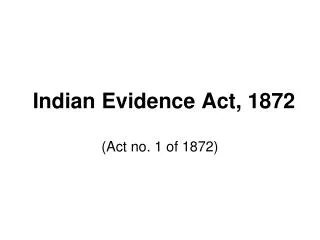
Indian Evidence Act, 1872. (Act no. 1 of 1872). The word ,evidence is derived from the Latin word evidens or evidere, which means “ to show clearly; to make clear to the sight; to discover clearly; to make plainly certain; to ascertain; to prove”.
1.24k views • 58 slides

THE INDIAN CONTRACT ACT 1872. Dr. Ravi Shekhar Vishal. Section 2 (h) defines a contract as “ an agreement enforceable by law” thus to make a contract there must be An agreement The agreement shall be enforceable by law. All agreements are not enforceable by law
717 views • 47 slides
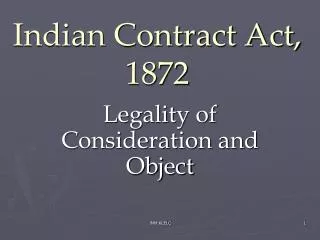
Indian Contract Act, 1872. Legality of Consideration and Object. S. 23 What considerations and objects are lawful, and what not. The consideration or object of an agreement is lawful, unless- 1 . It is forbidden by law; or
631 views • 26 slides

INDIAN CONTRACT ACT. NIREEKSHAN RAO :060125 SRIKANTH :060137. CONTRACT MANAGEMENT. CONTRACTS. THE WORD CONTRACT IS DERIVED FROM LATIN WORD ‘CONTRACTUM’ WHICH MEANS DRAWN TOGETHER;
714 views • 52 slides

www.answersheets.in info.answersheets@gmail.com info@answersheets.in 91 95030-94040 Corporate Law 1."All contracts are agreements but all agreements are not contracts." Discuss this statement in light of the essential elements of a valid contract. Also mention briefly the different kinds of agreements under the India Contract Act, 1872. 2. Discuss, what are the rights, liabilities and disabilities of a minor as per the Indian Partnership Act, 1932. 3. What do you understand by implied warranties and conditions of sale according to the sale of Goods Act, 1930? 4. Differentiate between lay-off and retrenchment according to the Industrial Disputes Act, 1947. 5. Give the provisions related to safety as given in the Factories Act, 1948. 6. What are the characteristics or essential features of a company and briefly mention the types of companies. 7. What do you understand by electronic governance and what are the attributes of electronic records as mentioned in the Information Technology Act, 2000. 8. Discuss the concept of free consent and misrepresentation as per the Indian Contract Act, 1872. 9. Distinguish between private and public company. What are the special privileges of a private company over public company according to Companies Act, 1956? 10. Write short notes on any two of the following: (a) Cyber regulation (b) Industrial Dispute (c) Breach of Contact (d) Voidable contracts. www.answersheets.in info.answersheets@gmail.com info@answersheets.in 91 95030-94040
133 views • 5 slides

The Indian Act. 1876. Basic Summary. All the laws related to Aboriginals are put together in one act. Under the act, Native Canadians were not legally qualified to make decisions for themselves. They were treated as children. They did not have sovereignty.
182 views • 11 slides

The Indian Act. 1876. The Department of Indian Affairs (DIA) was created to “look after” First Nations. Canada Takes Control (1871). No other ethnic group was targeted in this way. Basic Summary. All the laws related to Aboriginals are put together in one act.
295 views • 24 slides

THE INDIAN CONTRACT ACT, 1872. OFFER. OFFER. According to Sec.2(a), when a person made a proposal, when he signifies to another his willingness to do or to abstain from doing something. TYPES OF OFFER. Express offer Implied offer Specific offer General offer Cross offer Counter offer
2.44k views • 110 slides

THE INDIAN CONTRACT ACT, 1872. CONTRACT.
1.52k views • 121 slides